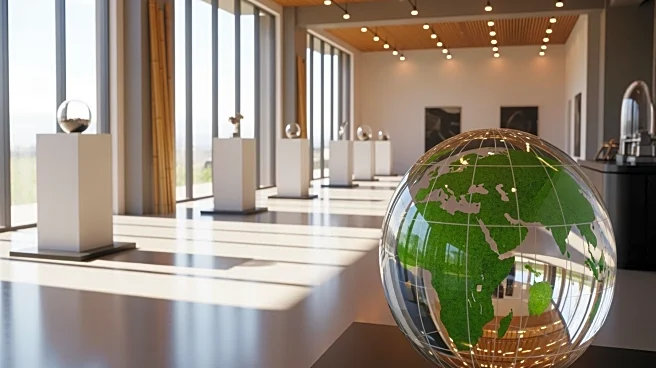What's Happening?
The Gallery Climate Coalition (GCC), a London-based organization comprising 2,000 members from the art world, has announced significant progress in reducing carbon emissions. According to a report titled
'Five-Year Review of Climate Action in the Visual Arts,' 80% of GCC members who began tracking their carbon footprint in 2019 have achieved a 25% reduction. The coalition aims to further decrease emissions by 50% by 2030. The report, released during London Art+Climate Week, highlights shipping, air travel, and energy use as the primary contributors to carbon emissions, accounting for 80-95% of the total. Notably, the largest 22% of GCC members are responsible for half of the emissions. Frances Morris, former director of Tate Modern and current chair of the GCC, emphasized the art sector's role in climate action, urging members to integrate creativity with climate initiatives.
Why It's Important?
The GCC's efforts to reduce carbon emissions are significant as they reflect a growing awareness and responsibility within the art sector towards environmental sustainability. The art world, often seen as a cultural influencer, has the potential to lead by example in the fight against climate change. By addressing high emissions from shipping, travel, and energy use, the coalition is setting a precedent for other industries to follow. The initiative also highlights the importance of cultural transformation alongside technical solutions, suggesting that the art sector can play a pivotal role in shifting societal norms towards sustainability. This move could inspire similar actions across various sectors, potentially leading to broader environmental benefits.
What's Next?
The GCC plans to continue its efforts by encouraging more members to adopt sustainable practices. This includes switching to renewable energy, reducing the publication of physical catalogs, and implementing more sustainable travel policies. The coalition's next phase will focus on integrating climate action with creativity, aiming to transform not only the art industry but also influence wider societal changes. As the coalition grows, it is likely to attract more high-profile members, further amplifying its impact. The success of these initiatives could lead to increased pressure on other industries to adopt similar sustainability measures.
Beyond the Headlines
The GCC's initiative underscores the broader ethical and cultural implications of climate action within the art world. By addressing overconsumption and disconnection, the coalition is challenging the traditional economic and social systems that contribute to environmental degradation. This approach highlights the need for a cultural shift towards sustainability, where art can serve as a powerful medium for change. The coalition's efforts may also prompt discussions about the role of art in addressing global challenges, potentially leading to new forms of artistic expression that prioritize environmental consciousness.









